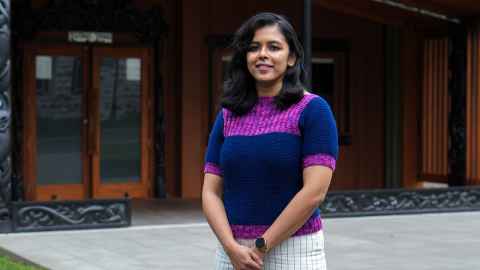Building an AI pronunciation coach for te reo Māori learners
28 July 2025
When Dr Jesin James began her research in speech technology, commercial applications were not at the forefront of her mind.

Dr Jesin James is standing at the heart of an ambitious, culturally impactful initiative: an AI-based pronunciation coaching platform designed to support learners of te reo Māori. What began as a small pilot responding to a teaching need has evolved into a pioneering project that could help revitalise a language and empower a new generation of speakers.
James is a senior lecturer in electrical, computer and software engineering at Waipapa Taumata Rau, University of Auckland. While completing her PhD, she became increasingly curious about the potential for research to create real-world impact. It was an interest strengthened by participating in initiatives like the Velocity Ideas Challenge, delivered by the University of Auckland Business School’s Centre for Innovation and Entrepreneurship (CIE). Supporting students who participated in the Velocity entrepreneurship development programme further reinforced her shift toward applying research beyond the lab.
Her core research focuses on speech technology for low-resource languages. These are languages that lack the large datasets typically required for machine learning models. Te reo Māori, New Zealand English, and many Indian and Pacific languages fall into this category. With fewer speakers and less data, these languages often go unsupported by major commercial technology solutions.
“Most technology we see around us works for American English, British English, or Mandarin,” James explains. “If your language is not one of those, it’s likely you’re left out of the digital world.”
The pronunciation coaching project grew from a practical problem. In te reo Māori courses at the University, particularly those involving teaching te reo Māori pronunciation, lecturers found themselves spending significant time giving detailed feedback on pronunciation. A solution was proposed. Could this feedback be automated?
Initially developed by a team including Dr Peter Keegan (Waikato-Maniapoto, Ngāti Porou), Dr Catherine Watson and Dr Piata Allen (Ngāti Kahungunu, Ngāti Hinemanu, Ngā Wairiki Ngāti Apa), the project aimed to mark pepeha submissions automatically. A pepeha is a Māori way of introducing oneself, and students in a Māori course were required to submit recordings of pepeha and receive feedback on its pronunciation.
Over several years, enough data and feedback was collected to explore a larger-scale solution. With this foundation, the team joined forces with James, an early career researcher with experience in working with speech technology for low-resource languages. Māori-owned technology company Te Hiku Media, the award-winning iwi broadcasting organisation and iwi innovation hub based in Kaitaia, also agreed to support the team in building what is now known as the Māori Pronunciation Coach.
Unlike standard speech recognition tools that simply determine whether a phrase is “right or wrong”, this platform is designed to understand how a learner has mispronounced a word and provide specific, constructive feedback. It also takes into account the concept of an “acceptable range” of pronunciation, recognising that early learners might not pronounce words perfectly but can still be understood. To support learners in reaching this range, the AI-based coach will guide them to adjust their mouth shape and tongue position, providing targeted support to improve pronunciation confidently.
It’s about building confidence. When learners feel they can say Māori words correctly, they’re more likely to use them, and that builds trust with Māori communities.

The project arrives amid growing demand for te reo Māori learning, which saw a 31 percent increase in uptake between 2021 and 2023. One of its most ambitious goals is to reach one million users within five years, with university courses serving as the ideal starting point. Pro Vice-Chancellor Māori Te Kawehau Hoskins has shown strong support, and by engaging directly with educators, students, and community leaders across Aotearoa, the project hopes to grow organically.
The initial version of the platform will be web-based, integrated into university systems such as Canvas. With the technical support of Te Hiku Media, whose CEO Peter-Lucas Jones has been named one of the world’s top 100 AI innovators, the team can easily pivot to a mobile app as needed.
The Māori Pronunciation Coach has also been recognised with MBIE’s Smart Ideas grant, enabling the team to continue research and development with strong national backing. Aligning with international efforts such as the United Nations Decade of Indigenous Languages, the project aims to provide a scalable process for developing similar language learning apps globally, supporting indigenous language revitalisation efforts around the world.
Developing technology for language revitalisation is not without challenges. Establishing the acceptable range of Māori pronunciation is one of the core research hurdles, as there is limited prior work in this area. Moreover, integrating feedback from educators, linguists, technologists, and community members requires ongoing collaboration.
“Working with people from different disciplines and worldviews has been the most rewarding part,” James says. “What makes this tool different from other learning apps is the richness of perspectives that have shaped it.”
For James, the most important lesson for researchers aiming to create social impact is simple. To engage early, and always with the communities you’re serving.
“If you build something in isolation and then expect people to use it, it’s not going to work. You need to ask the people what they need and let that guide your design,” she says.
Ultimately, the Māori Pronunciation Coach is about more than just individual learning. By helping more people speak te reo Māori confidently, the project supports a broader movement of language revitalisation. It reduces the burden on Māori educators, enables more learners to access high-quality feedback, and creates new research knowledge that can benefit other low-resource languages.
“Revitalising a language happens in many ways, and this project helps by increasing the number of confident speakers and by documenting the language itself in a new, meaningful way.”
Contact
Questions? Contact the Centre for Innovation and Entrepreneurship for more information.
E: cie@auckland.ac.nz